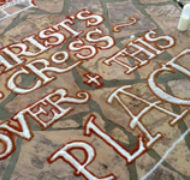Three Resources to Help You Listen
Blog / Produced by The High Calling
Last week, I messed up at work. Publicly. In a meeting with some colleagues, I became defensive when a conversation wasn’t going the direction I wanted it to go. I took it personally. I got frustrated. And I shut down.
The folks in the room weren’t sure what happened.
Heck, I wasn’t sure myself, so I spent some time this weekend reflecting. I asked for forgiveness. I sent notes of encouragement to everyone at the meeting. And I tried to remember how to listen. It’s a tricky, complex thing to do. So I kept my prayer simple. Help me be quick to listen and slow to speak.
For a professional word person, this is no small task. And it comes down to this. I am not the Word. That’s somebody else’s job.
Listen to Connect to Others on an Emotional Level
Jim Smith recently shared some wisdom on this topic at Fast Company in 9 Steps to Finally Shutting Up and Learning to Listen. This morning before work, I actually adapted his list of nine suggestions into a little poster that is sitting on my desk right now. He writes,
Poor listening habits are responsible for many of our daily woes. Whether it's a damaging disagreement with a co-worker, a miscommunication with a spouse or partner, or an awful customer service experience, the smoking gun is often a simple failure to pay attention--to truly listen to what the other person is saying…
If you really want to take listening to a more life-changing level and impact your excuse-making habit, then developing your heart-based "third-ear" listening skills is absolutely essential.
If you listen with your ‘third ear,’ then you don't filter what you hear with supposition, stereotypes, judgment, what someone else said, and bitterness. You don't let past experiences with someone limit your ability to truly empathize with someone else's ‘life load.’ Third-ear listening also means engaging and connecting with another human being on an emotional level.
Listening Is a Way to Offer Grace
Then, this morning, my friend and colleague Mark D. Roberts sent me a link to an interview about social media from Duke University’s Faith and Leadership. It’s no wonder I struggle to listen given that I work in social media. Yes, we began this community at The High Calling in an effort to listen to people. But so much of our research into best practices has come from marketers and fundraisers. Forgive us when we are too quick to speak here.
In the interview at Duke, Keith Anderson talks about his two books on digital ministry. I’ve not read the books, but they are now on my list. He says,
Most social media advice tends to be around marketing. It’s repackaged business advice... Digital ministry is more of a ministry-oriented, relationship-building approach to social media.
...It’s not about broadcasting or marketing. It’s about building relationships. …mostly a matter of offering grace in this digital world of Facebook and Twitter.
...Luther said our daily life is our holy calling… There’s absolutely a connection to social media. When I see people sharing and interacting on Facebook or Twitter, I think, ‘Well, God is not only present in the church; God is present when I’m changing diapers, or God is present when I’m washing dishes.’ I can be aware of that, and really feel grateful even in those moments and know that’s part of my ministry in daily life.
Often, social media gets knocked because, well, it’s so mundane. It’s about what people had for breakfast or what they’re doing. Who wants to know about that?
Well, I want to know about that, because God is there, and I get to bear witness to that. I can help people to see that, which is one of my favorite roles as a ministry leader.
Listening Is Quiet and Fragile
Finally, I watched a beautiful video from Laity Lodge this morning. Watching the five minute video meditation, I wondered again what it means to be salt. Growing up, I somehow thought being salt meant flavoring the world with my words. If the world wouldn’t listen, then I would flavor it with my bull horn.
Perhaps being salt means something else. Perhaps it is mostly a matter of listening to the world around us as we quietly go about our daily work.





